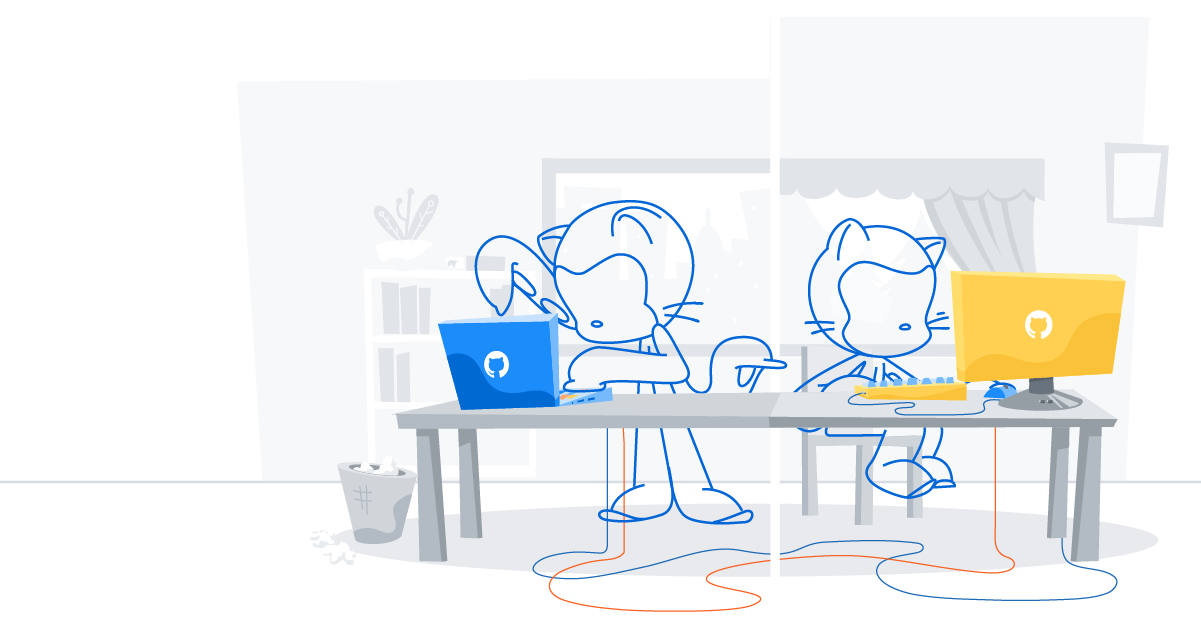Remote work: Engineering’s perspective on humanizing the remote work experience
The GitHub engineering team shares best practices for making remote work part of your company culture.

At GitHub, working remotely has been in our DNA from the start. With over 80% of our engineers working remotely before COVID-19, the team has established some amazing best practices that foster a strong collaborative environment, inspire creativity, and a bit of levity with the ultimate goal of building trust within teams.
What’s it like for GitHub engineers to work remotely? Next in our remote work series, Dana Lawson, our VP of Engineering, Product, and Sha Ma, our VP of Community and Ecosystem Engineering share tips to help humanize the remote work experience in order to build trust across teams. Dana is responsible for leading a team of engineers across the globe, and describes her remote experience at GitHub as “evening the playing field, where everybody participates and works together to build a global product with a global team.” Similarly, Sha has spent her career delving into today’s fast-moving, cutting-edge technology, and believes that now more than ever, we need to be intentional about how we think and communicate in order to help make the process feel more human.
How do you communicate and ensure that everyone is on the same page given that our everyday lives have changed so much due to COVID-19?
Sha: Given that we’re in the middle of this global health crisis and people are going through a lot of emotions right now, it’s very important to keep your employees in mind and add a human aspect to everything as best you can. It’s about being genuine, and most importantly, empathetic, specifically around the many personal disruptions that we’re all dealing with while working from home.
Dana: Adding to what Sha said, we’re privileged, with the engineering team in particular, that most of the team has been working remotely on a global scale for years. But we certainly don’t want to take our remote-first culture for granted with the COVID-19 pandemic just because we have this established workflow for working remotely. Now more than ever, we have to be intentional in our communications. With everyone juggling work and personal obligations, I cannot stress enough how important it is to write things down, as well as repeat information in different channels, to different groups, and to yourself. It’s very important to make sure that employees are using modern toolsets and multiple channels to communicate.
Sha: I agree, having strong written communications is so critical. We use a variety of tools for synchronous and asynchronous collaboration throughout the day—it’s important to summarize decisions and post them consistently for predictability. At GitHub, we use our internal repositories for announcements, updates, and decisions to help employees stay aligned. Oftentimes, simply restating what you’ve decided can save time in lieu of setting another meeting.
Any advice on how to manage personal and professional schedules during this time?
Dana: When it comes to working from home, the greatest lesson I can offer is to develop constraints. There will be times when it’s okay to turn off Slack, or it’s okay to turn on your out-of-office message. Just because you happen to be at home doesn’t mean you don’t have a life.
Sha: One of the things that I really appreciate about a remote culture like GitHub is that people are very intentional about blocking off times on their calendars. I currently block off time for lunch and 15-minute breaks throughout each day to ensure my two kids at home eat a healthy meal and stay on a good schedule. As a leader, it’s especially important to acknowledge reality and encourage open dialogue. It’s perfectly okay to block off time to take care of yourself and your family and make it publicly visible so that your teammates know.
How do you work with teams that are spread across many different time zones and locations?
Dana: If you have a team that’s spread across multiple time zones, it’s useful to hold important meetings or convey information twice a day. You can develop systems, much like nurses do during shifts. When it’s time for your shift, you have a list of all your patients (or projects) and can see what’s going on for that given situation. Then, once you’re done with your shift, the next person can follow those same practices, see what they need to handle for the day, and go from there. This is a clear practice of asynchronous communications, which can be a very effective way of helping teams work in concert.
Sha: At GitHub, we record all of our All Hands meetings, and make them available globally within 24 hours, including highlights from the meeting in written form. As another example, most of our employee resource groups have roundtable-style discussions, where they try to schedule two meetings—early morning and afternoon—as a way to accommodate the different time zones.
Do you have any advice for new employees who are starting to work remotely?
Sha: I find the buddy system to be very helpful. Many times, an onboarding document or session may not be enough. As a result, we pair each new employee that’s starting out with an onboarding buddy. This practice gives new hires someone to ask those “obvious” questions, such as “Where do I find the org chart?” or “Which Slack channel do I use?” and to learn what is unique to the specific team.
Dana: Everybody keeps saying (and repeating), “Turn your cameras on” (for video conference meetings). And though it seems so simple, it really makes such a big difference. Certainly, there are times for big meetings or webinars, where you don’t need your camera on, but if you’re in a small quorum of five to six people, it’s best to turn on your cameras. That said, I realize we’re all in this health crisis and that many people are uncomfortable showing themselves in their home environment. My advice here is to be as vulnerable as you can, without sacrificing your well-being. We’re all freaking out right now—this is not an easy situation. We may not have done our hair, shaved, or might be wearing sweats, but at the end of the day, these are your trusted people. They don’t care if you have clean pants or if you didn’t shower. They just want to make sure that you’re okay. If you don’t feel comfortable in your home environment, use a virtual background. Display your favorite place and attend the meeting while you’re “working on the beach.”
What do you value most about remote work?
Sha: I remember very clearly one of my first meetings at GitHub. I was on a video call, and I heard so many different accents from around the World, and I felt really proud to work for a truly global company. We are all in this journey together to enable developers and development communities across the world, while bringing people a bit closer and making the world a better place. It’s such a great feeling to be able to connect with people on a global level.
Dana: Like Sha, what I value the most about remote work at GitHub is that we’re a global team and a global product. Every day, I get to speak with people from Africa to Scotland to Colorado—literally all over the world. And what’s amazing is that our culture here makes us feel a little bit closer. I believe in the power of open source. It has demonstrated that random people from across the globe can work asynchronously and advance human progress. I truly believe this is the future, and I’m so grateful that GitHub laid the foundation for this from the start. It’s amazing to see the rest of the world already adapting, and believe that this is the new normal that will ultimately deliver better products on the other side of this.
Want to learn more about best practices for working remotely? Check back next week as we continue our series to help you make the most of working in a remote environment from our next interview. And share these useful tips with others who may be new to working remotely.
Explore the remote work series
Tags:
Written by
Related posts

How GitHub engineers tackle platform problems
Our best practices for quickly identifying, resolving, and preventing issues at scale.

GitHub Issues search now supports nested queries and boolean operators: Here’s how we (re)built it
Plus, considerations in updating one of GitHub’s oldest and most heavily used features.

Design system annotations, part 2: Advanced methods of annotating components
How to build custom annotations for your design system components or use Figma’s Code Connect to help capture important accessibility details before development.